Linux Piter Speakers # 2 meet
The speakers of the Linux Piter Conference # 2 , which will be held on November 11-12, 2016 in St. Petersburg, shared with us their opinions on the important current changes in the Linux ecosystem, and what to expect in the near future; they told us what tools they use in their work, recommended useful resources, blogs, communities, conferences on their subject to us, and, of course, answered the most important question: “what distributions do they use?”.
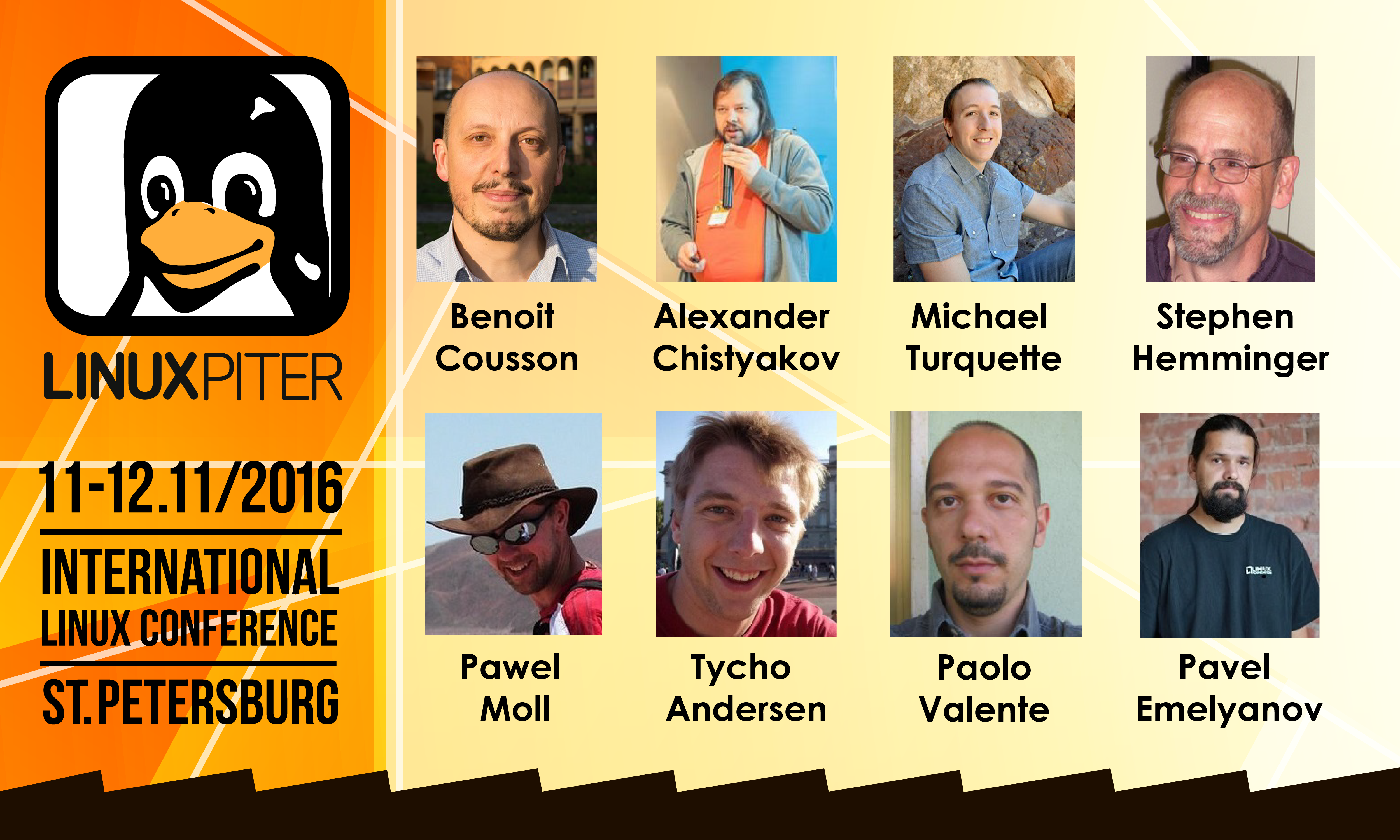
We received many answers to our mini-questionnaire and decided to collect everything in one publication, without breaking the material into several posts, especially since this article is read in one breath.
')
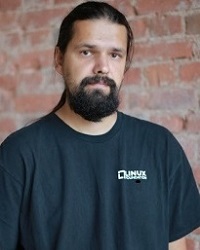
Virtuozzo / Architect / Russia. Moscow
#LinuxPiter 2: These containers were given to you!

Microsoft / Principal Software Architect / USA. Portland
#LinuxPiter 2: How Linux beat Bufferbloat .
#LinuxPiter 2: Linux network report .

Tarantool / SRE / Russia. Moscow
#LinuxPiter 2: How to make PaaS with Docker, Consul, and Python Binding

BayLibre / President and CEO / USA. Los angeles
#LinuxPiter 2: So you want to write a Linux driver subsystem?
#LinuxPiter 2: Introduction to Power Management

Tempesta Technologies / CEO / Russia. Moscow
#LinuxPiter 2: Tempesta FW: yet another Linux kernel Web accelerator

Perkona / Technical Writer / Russia. St. Petersburg
#LinuxPiter 2: Configuring Linux for your database .
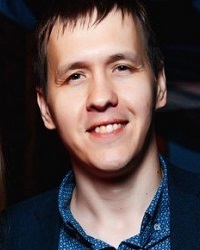
STC Metrotek / CTO / Russia. St. Petersburg
#LinuxPiter 2: We create from scratch an ethernet-device based on linux and FPGA
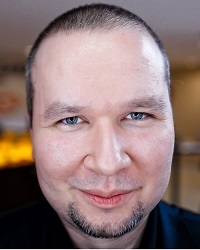
STC Metrotek / Lead developer / Russia. St. Petersburg
#LinuxPiter 2: We create from scratch an ethernet-device based on linux and FPGA
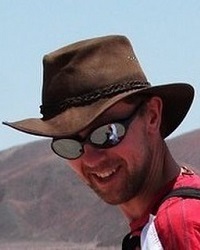
ARM / Principal Engineer / United Kingdom. Cambridge
#LinuxPiter 2: How do debuggers (really) work .
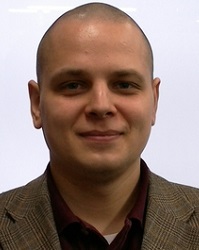
Engineer / Russia. Moscow
#LinuxPiter 2: Experience replacing XFS with BlueStore at Ceph

Jetware / CTO / Russia. St. Petersburg
#LinuxPiter 2: How devops exhaust itself, and what happens next

Canonical / Software Engineer / USA. Danver
#LinuxPiter 2: Live migration in LXD

Ural Federal University / Postgraduate / Russia. Yekaterinburg
#LinuxPiter 2: A New Era of Wireless Decentralized Self- Organizing Networks
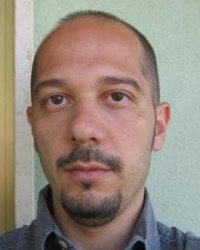
Universita di Modena e Reggio Emilia / Assistant Professor / Universita di Modena e Reggio Emilia
#LinuxPiter 2: The quest for low latency with block I / O
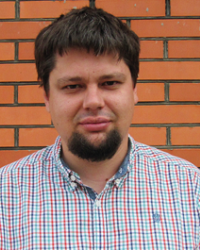
okmeter.io / Co-founder / Russia. Moscow
#LinuxPiter 2: Well-Supported Production Application
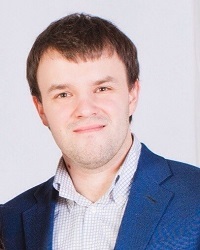
Radics / Head of Product Development / Russia. St. Petersburg
#LinuxPiter 2: Let's talk about NVMe over Fabric

Synopsys / Senior Software Engineer / Russia. St. Petersburg
#LinuxPiter 2: OpenWRT - the most affordable embedded Linux distribution
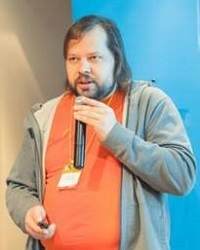
DataArt / Senior Software Engineer / Russia. St. Petersburg
Linux Piter Program Program Committee Member
#LinuxPiter 2: On-line analyzing again:
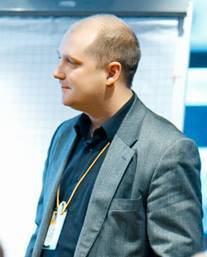
MOEVM / Head of Department / Russia. St. Petersburg
Member of the Linux Piter Conference Program Committee
See you on November 11-12, 2016 in St. Petersburg at the Linux Piter # 2 conference.

We received many answers to our mini-questionnaire and decided to collect everything in one publication, without breaking the material into several posts, especially since this article is read in one breath.
')
Questions:
- Briefly tell about yourself.
- Tell me about your professional interests in free software and Linux?
- What has changed over the past couple of years in the Linux ecosystem and in your subject area?
- What do you think will be changes in the next 2-3 years?
- What useful resources, sites, blogs, communities, conferences and so on, in your subject area could you recommend?
- What technical innovations, software and / or hardware solutions of recent years do you especially remember?
- What tools, besides editors, do you use, why and why?
- What distributions do you use on your work and home PC? Why?
Answers:

Pavel Emelyanov
Virtuozzo / Architect / Russia. Moscow
#LinuxPiter 2: These containers were given to you!
- A nuclear programmer (although I’m not already doing core research, but there are no ex-ones here).
- Today, they are almost entirely in the CRIU project.
- In the core ecosystem, the main change of recent years is “Microsoft loves linux”. It is not clear how sincere and for how long, but this is a qualitative leap. First they ignore you, then they laugh at you, then they fight you, then you win. Now it has even gone further - then they join you.
In the subject area, containers have become habitual, the whole “movement” has gone from the kernels to applications (yes, to Docker and its ecosystem). - The orchestration projects will gain strength, or it will become possible to use.
Extinguishing what we call OS-containers, that is, isolation by the kernel will remain only for launching applications, distributions will run in VMs. - Heh ... This is open-source, there are too many things. In principle, there are two big good conferences - Linux Plumbers for engineers and ContainerCon for non-them.
Good communities will not be recommended, they are usually formed around projects, and their goodness each determines for itself. - Docker for Mac & for AWS. It was very cool, but the public has not yet felt all the coolness (well, technologically, of course, there is where to go).
- Standard development. Make, git, gdb, strace. For development, and because it is convenient and sufficient for my needs.
- On a working Debian, for it works, on a home Ubuntu, because using CLI in everyday tasks is not very convenient.

Stephen hemminger
Microsoft / Principal Software Architect / USA. Portland
#LinuxPiter 2: How Linux beat Bufferbloat .
#LinuxPiter 2: Linux network report .
- His current job is making Hyper-V and Azure better.
- I am interested in all aspects of Linux networking: APIs, connectivity, performance and new technolgies.
- The basic stuff almost all works perfectly. The focus has been shifted from making virtualization works (now it does), to making containers work (still work in progress).
- All commercial applications will be on the cloud. Things that are now done. Problems will still exist but be harder.
- Many things become less technical (and more marketing) as things mature. I would recommend are netdev and DPDK. Both have active contributor groups and semi-annual conferences.
- The BBR and Codel innovations (from Google) were both surprisingly and well though out.
- Too much manual building and integration with git etc. Should you really like it?
- I have two laptops. One corporate running Windows (with Linux VM) and one personal running Linux (with Windows VM). Use Run Fedora, RHEL, and Ubuntu.

Konstantin Nazarov
Tarantool / SRE / Russia. Moscow
#LinuxPiter 2: How to make PaaS with Docker, Consul, and Python Binding
- I help companies build Continuous Delivery pipelines and processes around them.
- I am interested in everything related to software development tools. Indeed, while the world is moving toward VR and advanced input devices, developers still use teletype imitation. This is a big omission, and I hope to see a day when we all will be using truly user-friendly interfaces. And I hope to participate as much as possible.
- I love where the Linux kernel goes in terms of development. In recent years, many interesting subsystems have appeared, performance analysis tools have improved, DPDK, NVMf, etc. have appeared.
And, of course, there is significant progress in the field of containers and packaging applications.
From programming languages, a real surprise is Rust. - I think in the next few years we will have a cardinal rethinking of the traditional CLI tools used by developers and admins. It will become much more powerful and intuitive. As an example, sysdig, ripgrep and gitless.
- Unfortunately, online media is such an echo chamber. The same ideas are repeated many times. It does not help you to do something special. I encourage everyone to read less of popular sources, and write more to your github.
- In terms of hardware solutions in recent years, I especially remember YubiKey Nano. This is a two-factor authorization solution, really made for people. And because of the design features (USB keyboard emulation), it works on all operating systems.
- In addition to text editors, I use Emacs very actively. I use it as a tiled WM, or, if you like, as a replacement for tmux on steroids. Sometimes I use Jupyter for interactive work with data.
- I have one computer for all needs - MacBook Pro. It has OS X. I do all my Linux-related tasks in Docker under the Alpine distribution. He has a good package manager, and the base system takes only a few megabytes. Over the next few months, I will try NixOS as a potential replacement for Alpine.

Michael turquette
BayLibre / President and CEO / USA. Los angeles
#LinuxPiter 2: So you want to write a Linux driver subsystem?
#LinuxPiter 2: Introduction to Power Management
- Mike is the CEO of BayLibre, an embedded Linux consultancy and co-maintainer of the Common Clock Framework in the Linux kernel.
- My interests are mostly around the mainline Linux kernel. I also like to take risks; motorcycle helmet with a heads-up display.
- For a few years back. The arm-soc tree has helped with that. The industry has affected many Linux kernel hackers.
- In the next 2-3 years I suspect that multimedia support in-kernel will continue to improve. Hopefully, you can use it.
Additionally, I think that it will be a hot topic, especially in the IoT and an embedded space. - Pulse of Linux kernel development. Open source software developers. For conferences, I’m Small events were you find passion for the work.
- LAVA has been used for the Linux kernel. It has been established that it has been taken.
On the software side, I’m going to continue to change the world. For robotics, I have seen a rapid adoption of SLAM techniques. Similarly, computational photography is one - I’m using both a vim and an emacs, so there :-)
For daily work I run macos with iTerm2, tmux, fish shell, and gpg 2.1.
I’m highly opinionated about offlinemap, msmtp, notmuch and alot since 2012. I’ll be able to. - I run it. Where I compile kernels and build Android and Yocto. I also have a run on my QNAP NAS, which is my home office.

Alexander Krizhanovsky
Tempesta Technologies / CEO / Russia. Moscow
#LinuxPiter 2: Tempesta FW: yet another Linux kernel Web accelerator
- Founder and CEO of Tempest Technologies Technologies and Natcys Laboratory, specializing in high performance computing consulting in Linux / x86-64.
- The main developer and architect of Tempesta FW, an open source Application Delivery Controller (ADC) integrated into the Linux kernel.
- Tempesta FW appeared :) For a couple of years or not, people came to the conclusion that Linux's TCP / IP stack is slow and there are quite a few mature and not-so-good projects for making TCP / IP stack in user-space.
- Wait and see. It is quite possible that the kernel bypass technology will be distributed to handle network traffic, the user space TCP / IP stack library in the mainstream will appear ...
- Our blog .
- The first thing that came to mind was the Sandstorm research project.
- A compiler :) An ordinary developer's toolset.
- I work and do not work for one laptop on which Fedora stands. C Ubuntu did not go, but for troubleshooting with Gentoo no longer enough time.

Alexey Zhebel
Perkona / Technical Writer / Russia. St. Petersburg
#LinuxPiter 2: Configuring Linux for your database .
- Techie confused in words.
- Markup languages and documentation generators, information typing and content management, databases and high-load systems.
- As in all areas related to Linux, the number of users without an extensive technical background and experience (such as myself) is increasing. Open source software is becoming increasingly available.
- I think that the tendency to attract technically unqualified users will continue and increase. Administration of Linux-servers will be available to anyone, even with minimal ideas about the features of Linux and work in this ecosystem.
- writethedocs.org / idratherbewriting.com / everypageispageone.com / www.percona.com/blog / www.percona.com/live/conferences / allthingsopen.org
- Raspberry Pi, Arduino and other single-board for learning and enthusiasts. Vagrant and Docker. MongoDB and the rise of NoSQL as a whole.
- Sources are stored on GitHub, so git every day. Docks are collected by sphinx generator from source in reStructuredText. We automate assembly in Jenkins.
Vagrant is still almost every day, I launch our products in boxes to check if the procedures I described work. Well, as a result, a little ansible, so that your hands do not repeat the same thing every time. - I have a MacBook Pro, I run vagrant boxes with Ubuntu and CentOS, in which I bring up MySQL and install our products.
Ubuntu has been on a home PC for 6-7 years. A couple of years ago, she set her up even to her mother. At the moment I consider it the most convenient for everyday home use.

Pavel Kurochkin
STC Metrotek / CTO / Russia. St. Petersburg
#LinuxPiter 2: We create from scratch an ethernet-device based on linux and FPGA
- Embedded developer with an FPGA past and with extensive management experience.
- My interest lies in the open-source development of devices based on FPGA.
- All devices are now linux. Previously, we still did something bare-metal or with tiny embedded OS :)
- I think that parallel computing on FPGA will become main-stream.
- Recently, most began to receive from facebook. Apparently, the corresponding circle was formed. I am on Habré.
- Altera System-on-chip, of course.
Although the topic of embedded and does not apply, pleased qml from qt. Never before encountered a declarative description of gui. - Bash is understandable here, the work in the shell is familiar and convenient. Make - wherever you need to process a lot of data. Markdown - for documentation. Rsync - to synchronize data. Git, svn, by itself. In other words - a lot of console utilities.
- Debian at work. in fact, for historical reasons :) Houses - mac os x.

Denis Gabidullin
STC Metrotek / Lead developer / Russia. St. Petersburg
#LinuxPiter 2: We create from scratch an ethernet-device based on linux and FPGA
- A system programmer and FPGA developer with a great sense of humor.
- Network controllers, network drivers. In principle, any high-performance systems. Heterogeneous computing with CPU / GPU / FPGA.
- Batch processing is increasingly moving to userspace. SoC appeared with ARM and FPGA on board.
This gave room for engineering solutions. There is a new type of memory - Hybrid Memory Cube (HMC). True, all this is far from the Linux ecosystem :) - Forecasts are an ungrateful thing :) IoT will be everywhere. The number of SDN solutions will increase.
- Basically - these are books, datasheets and source code. For those interested in FPGA: opencores.org
And also our free courses :) However, this year the set has been completed. - Rust It seems that it turned out pretty good language.
- Awesome, vim, bash, grep, sed and other command line utilities. Nothing more is needed :)
- I do not like holivarny questions. I use Debian everywhere. Because it suits me completely.

Pawel moll
ARM / Principal Engineer / United Kingdom. Cambridge
#LinuxPiter 2: How do debuggers (really) work .
- I’m not writing too much code these days (probably still speak)
- For many years now I’m focusing on performance analysis, particularly at microarchitectural level. It is better to work.
- It is all about containers these days! I am not saying this subject is boring, but ... ;-)
- I’m not looking for a fundamental computer architecture. One area is that it is a principle of learning to be in new areas, usually with game changing results.
- There is no website for anyone even more distantly interested in Linux. I did not attend any Linux Plumbers.
- It was a slow motion. Also, have I already mentioned machine learning? Check out the progress of compute vision in the last
2 or 3 years! - Whole loads of performance analysis related tools. Starting with a pretty standard Linux perfume through dynamic binary configuration, Dyninst or DynamoRio to custom microbenchmarks. There is a pattern forming, I guess ... :-)
- Right now? Ubuntus and Debians, because that's what is widely used by my colleagues. Previously Fedora, because that's what you used? I can proudly have Slackware 2.0 (or maybe was it even 1.0) back in those days.

Maxim Vorontsov
Engineer / Russia. Moscow
#LinuxPiter 2: Experience replacing XFS with BlueStore at Ceph
- A linuxoid, for which it is not only a job, but also a hobby.
- First of all, these are SDI, containers and automation.
- There was no revolution. Different movements are constantly happening, to those who are in the subject, it is difficult to single out one thing. The success of Let's Encrypt, for example, seems to be a noticeable thing, and even among my colleagues there are those who do not know what it is. Well, it seems to be already 2% on desktops)
- Microsoft Linux and SkyNet :). Seriously, OpenSource won. And then it will be faster, higher, stronger. And the most interesting and revolutionary events await us in the field of machine learning, neural networks, blockchains and attempts by states to control the Internet.
- Here are some of my subscriptions:
blog.nextthing.co
ceph.com
www.cyanogenmod.org
fedoraproject.org/people
www.fsf.org/blogs/recent-blog-posts
geti2p.net
blog.torproject.org/blog
letsencrypt.org
www.linux.org.ru - carefully, anonymus lives here
googleblog.blogspot.com
www.omgubuntu.co.uk
www.opennet.ru/opennews
planet.debian.org/rss20.xml
sebastien-han.fr
xkcd.com - CHIP / PocketC.HIP - like RPi, only better. Let's Encrypt - TLS for everyone. Ceph - SDS on commodity hardware
- Ansible - to everywhere and immediately. Virtuals and containers - to easily roll and roll. Eclipse - not to forget that there is nothing better than VIm.
- Debian - because it has everything that is in Linux, and the release names are interesting. CentOS / RHEL - the main distribution on servers.

Cyril Evenings
Jetware / CTO / Russia. St. Petersburg
#LinuxPiter 2: How devops exhaust itself, and what happens next
- System engineer - looking for a system, build a system.
- System programming, distributed computing, virtualization, self-managed server systems.
- In most areas it is developing at a tremendous pace Especially orchestration.
- I can only judge by the area in which we work - avoiding the operating system, as a place in which programs are embedded, to the fact that for programs or for projects involving several programs, separate working environments prepared specifically for these programs will be used.
- Wikipedia, GOTO Conferences
- Docker, Mesos, LoRa (LPWAN), Intel Edison
- The last year is the simplest: strace, gdb, ftrace, systemtap, tcpdump. To analyze or debug programs or modules.
- Ubuntu As a set of drivers for computer and peripherals, and a graphical terminal. Work goes in chroot environments or virtual machines with operating systems for specific tasks.

Tycho andersen
Canonical / Software Engineer / USA. Danver
#LinuxPiter 2: Live migration in LXD
- My name is Tycho Andersen, and I'm currently an engineer at Canonical working on Linux Containers.
- I’m very interested in the Linux kernels (namespaces, cgroups, LSMs, seccomp, etc.), and I’m working on the LXC / LXD full time. If you’ve been working for a checkpoint, you’ve been able to check for restore functionality.
- I’ve seen the LTS release in April of this year. It will be supported for a long period of time.
- I have no idea, which is exciting :). It would be a good idea to take advantage of it. It would be very interesting, however, it would be very interesting.
- I’m a Linux conference call, because it’s so engineering focused. Otherwise, follow the CRIU mailing list for checkpoint-restore related patches.
- This is a very interesting way to work. It is a cool water.
- Qtile, and urxvt.
- I use Ubuntu on every machine that I own. I’ve been working since 2007. I’m a lot of software available now. features like ZFS.

Kirill Lukonin
Ural Federal University / Postgraduate / Russia. Yekaterinburg
#LinuxPiter 2: A New Era of Wireless Decentralized Self- Organizing Networks
- A longtime supporter of open source software, cheerful and sociable, the same person who has books on programming and networks on the shelf side by side with music literature, metallurgy and construction, and he hopes to someday read it.
- Linux is interesting, above all, from the application side, as a tool for organizing services and systems. Recently, again pulled into the wireless network, and there is something to exert their forces.
- Of the most significant changes, perhaps, this is a manifestation of the open implementation of 802.11s and the inclusion of the new version of Batman-adv in upstream. The rest is the implementation of 802.11 substandards and the development of wireless module drivers.
- I think, the drivers for the new 802.11ad standard modules will be included in the core and will make full support for airtime fairness at the level of mac80211. Also, we are waiting for the time when the handover from the operator's lte / 5G network to wifi becomes the usual norm.
- It is difficult to recommend the conference, it may offend those whom I did not recommend. I can say that it is worth paying attention to all the conferences in your professional field, and if there are local ones, then try to attend them. Of those that I would recommend to pay attention in the first place - this is Openwrt Summit, Make-Wifi-Fast and BattleMesh with a mandatory subscription to the newsletter. So you can get the latest information.
- I especially remember the manifestation in the market of powerful small modules for IoT. These are ESP8266, RTL8710, full-fledged Linkit One, Omega2. I still sometimes remember the project Black Swift / Unwired One, which has been shelved for the time being, and it’s a pity I had great hope for it.
- A little bit of everything, I am trying to program microcontrollers on the sly, I use IDE. In general, embedded systems discipline and train the console. So this is a huge number of console utilities for various purposes. Even in dolphin, my terminal panel is always active. For musical creative explorations, there are Lmms and Ardour, rakarrack, hydrogen, mixx and a whole bunch of different multimedia software with plugins.
- The previous answer is already clear that I use KDE. I use for a long time, because I like it. Distribution Kubuntu 16.04 for the same reason. I came to this for a long time through RH, ASP, Mandrake, Mandriva, OpenSuse, Fedora. For network devices used to use OpenWRT, now switched to LEDE because of the new kernel and the most relevant patches.
At work, the distribution depends on company policy. Sometimes it is possible to use what you like, sometimes corporate software is simply impossible to run under Wine and you have to use Windows.

Paolo valente
Universita di Modena e Reggio Emilia / Assistant Professor / Universita di Modena e Reggio Emilia
#LinuxPiter 2: The quest for low latency with block I / O
- For kernel hacking.
- I'm keen on scheduling for providing quality-of-service guarantees (low latency, responsiveness, guaranteed bandwidth, ...). Some of my contributions follow. I’m a packet scheduler that has been replaced by the QFQ + protocol, it has been replaced by the QFQ +, it has been replaced by I / O scheduler, it is a question of what I’m like to use. I have been defined and are now in FreeBSD.
- The Linux kernel is undergoing a stack of stack, named blk, called blk-mq. The latter can cope with millions of IOPS.
- Blk-mq is expected to completely replace blk in the short / medium term.
This implies that it will be important. For example, it’s a non-trivial task. - The BFQ I / O scheduler: algogroup.unimore.it/people/paolo/disk_sched
The S benchmark suite on Github: github.com/Algodev-github/S
The linux block mailing list (rather technical): linux-block@vger.kernel.org
The Linux Weekly News online magazine (general source of information): LWN.net - It’s caused by the Linux kernel.
- I use performance monitoring tools a lot:
perf -> to profile code
blk-trace -> for debugging and tuning
iostat -> to keep overall throughput and IOPS under control
iotop -> to analyze performance in more detail
S benchmark suite -> to perform real-world throughput performance measurements (throughput, latency, responsiveness, fairness, ...); this suite, in its turn, uses most of the above tools. - So far I have not used much any distribution kit.

Nikolay Sivko
okmeter.io / Co-founder / Russia. Moscow
#LinuxPiter 2: Well-Supported Production Application
- A long time engaged in the operation of IT systems
- It’s hard to pick out a piece, I’m most interested in diagnostic systems for various services, but I try to maintain my horizons in all directions.
- I do not know how much this can be considered novelties, but I note the DPDK and golang
- The focus is strongly shifted towards distributed systems (storage / computing / management). There are many unsolved problems in this area, I think that there will be significant changes
- If someone else does not know, it is very interesting to read aphyr.com to test distributed systems.
- I really liked the story about scylladb: they took and wrote cassandra again, strongly pushing for optimization (there is also DPDK and all sorts of interesting things)
- I have enough browser, terminal and ide to develop
- MacOS, I hate to spend time configuring

Sergey Platonov
Radics / Head of Product Development / Russia. St. Petersburg
#LinuxPiter 2: Let's talk about NVMe over Fabric
- I define the path of product development (software-defined storage) in the Russian company RAIDIX
- Everything related to the topic of data storage and high-performance networks: software-defined open source storage systems (infrastructure and management), support for new devices, new protocols, new approaches, parallel file systems, Infiniband, 100G Ethernet, non-volatile memory ... Also to me interesting virtualization: server and container.
- Obviously, many hardware manufacturers and software developers have paid close attention to solutions such as Ceph, Open vStorage, Gluster. Almost all vendors have, at a minimum, reference architectures, and many make a significant contribution to development. In parallel, several dozens of new solutions are being created.
Software begins to emerge, using new approaches to manage horizontally scalable infrastructures.
NVMe protocol adapts very quickly. I don’t remember such speed and interest. For example, the first prototypes of NVMe over RDMA were publicly shown for the year and the appearance of the standard.
With the advent of fast devices and storage, we see that the recipe “core is a bottleneck, exclude it from the Data Path” is increasingly used in the development of performance-sensitive application storage. - I look forward to moving forward in the field of adaptation Storage Class Memory (new types of memory that will stand in the hierarchy between RAM and NAND Flash)
- Probably the most useful for me in the last six months have been blogs and forums, posted in the social sections of intel.com and mellanox.com . Of course, not to mention LWN.net . Russian-speaking sources: Shuklina's blogs (amarao), a good technical blog from the True System company, I like the Trinity company forum, several blogs of companies on Habré.
If we talk about conferences, from foreign I can highlight:- Open Fabric Alliance Workshop
- Luster User Group Conference
- Msst
- SNIA SDC
Events hosted by The Linux Foundation. In Russia, we can talk about Linux Piter , some events organized by Yandex, we (RAIDIX) have been holding the ProStor technology forum for the second year. Excellent conference Highload ++ . Something interesting can be found at CEE SECR , the last time I was disappointed with the quality of most reports. In Russia, HGST has an excellent team, and the guys spend interesting “Technical breakfasts”. - Open Fabric Alliance Workshop
- I like to “squeeze” the maximum out of iron, so now NVMe drives from HGST and 100Gb coherently adapters from Mellanox come to mind. The constant feeling that you can increase your productivity is not letting go yet, and I am sure that after my presentation on Linux Piter I will not stop and will continue to develop my stand.
Waiting for 3D Xpoint from Intel and ReRAM from WDC. - Various tools for monitoring system performance, profiling and tracing. This is due to the fact that one of my tasks is to study new technologies, understanding what is happening in the system.
If we talk about the last few months, the most popular tools for me were:
1) Benchmarks (fio and specialized benchmarks for testing the performance of parallel FS);
2) Utilities for testing performance and diagnosing networks (More often Infiniband-networks);
3) Utilities from the sysstat package;
4) perf, top, nmon;
5) sg3_utils, nvmecli and utilities from manufacturers of flash-devices. - On the PC, I use MacOS :). On servers, we mostly have RedHat-like distributions. This is due to the fact that a lot of software used in large companies is written under RHEL, and not all of it is open source.

Alexey Brodkin
Synopsys / Senior Software Engineer / Russia. St. Petersburg
#LinuxPiter 2: OpenWRT - the most affordable embedded Linux distribution
- System programmer with a focus on embedded Linux.
- I am engaged in support and adaptation of free software for Synopsys DesignWare ARC processors. , , Linux, . , Linux.
- , , . , , — «» «» . , «» . , , « » X , . Heartbleed, dirty COW? No, not heard.
- , Linux .
, Linux Foundation RTOS «Zephyr» 2-3 RTOS IoT. - №1 — Embedded Linux Conference ( , ). - Embedded Linux . c -, , OpenNet.ru — , , .
— LWN.net - Raspberry Pi, . Linux . «» , — - , ?
- — git. , , git , . , git, SVN Perforce.
- «» — Fedora.
( ):
— Fedora Ubuntu, ( , ) Unity, Mir ..
— Fedora — «master branch» RHEL, RedHat. , Fedora , RHEL.
“As a Linux kernel developer, I really like the fact that the freshest kernel quickly appears in Fedora. Ubuntu has to wait for a new release of the distribution, and in Fedora a few weeks after the release of Linus, the new kernel, I already use it to its full height on a working machine.
“Fedora is also available for a vast fleet of single-board computers with ARM processors, which is not the case with other distributions.

Alexander Chistyakov
DataArt / Senior Software Engineer / Russia. St. Petersburg
Linux Piter Program Program Committee Member
#LinuxPiter 2: On-line analyzing again:
- Once I went out for a walk in the forest park, and when I came back, there was a computer with Soft-Ice at home.
- — , , , .
- Linux ?
1) systemd ( — ),
2) Linux DTrace Solaris ( , Ubuntu 16.04 LTS ). - 1) Linux Unix ( , systemd, !). 2) OpenStack , , «enterprise», . 3) Mesos, Kubernetes DC/OS , ( ?) enterprise.
- Hacker News. . LWN.net
- Spacemacs — ViM, , Emacs. Golang — , , PHP. Nim — , , Lisp.
- , , — , Ansible — .
- Linux Mint ( Nr. 1 DistroWatch, ), Ubuntu Server LTS ( ).
- Linux Piter, ? , ?
(QUIA POSSUMUS). , . .

MOEVM / Head of Department / Russia. St. Petersburg
Member of the Linux Piter Conference Program Committee
- Teacher, programmer, researcher, supporter of the movement Open Source.
- My main interest is the promotion of open source software and Linux in the student environment. I do offline and online programming courses in Linux and beyond. Research interests lie in the field of data storage systems, virtualization, mobile robotics (specifically, SLAM-algorithms and ROS).
- It seems to me that for those years that I am familiar with Linux and the fact that near, these technologies have stepped into the field of maturity - they are serious, relevant, professional, you can rely on them, you can learn from them, you can use them, and many have become the standard de facto.
- Singularity on Kurzweil? If a little more serious, then maybe:
- "Commodization" of the equipment of mobile devices [phones / tablets] (The user himself will be able to choose which OS to install on his phone)
- integration of service robots into everyday life (although not with us, probably for now)
- Smart Environments will become really smart - Hmm, depending on whom to recommend ...
- lwn.net
- duartes.org/gustavo/blog
- www.ros.org
- lxr.free-electrons.com
- www.opennet.ru
- wiki.osdev.org
- ocw.mit.edu/courses/electrical-engineering-and-computer-science/6-828-operating-system-engineering-fall-2012
and indeed many MIT courses. - - git for everything ... when changes are under control, it's great
- linux containers / docker - the same as git, but for larger actions, lightness ...
- trello - sorting and execution of tasks, lightweight lists in agile style - Ubuntu - historically. It seems there is almost no particular difference if customized.
- You're a member of the Linux Piter conference program committee, why do you need this? What and how much do you get, what and how much do you have to give?
Why: people, technology, everything at the intersection of my interests. Very cool. I give - less than we would like; I receive - more than I expect.
See you on November 11-12, 2016 in St. Petersburg at the Linux Piter # 2 conference.
Source: https://habr.com/ru/post/314578/
All Articles